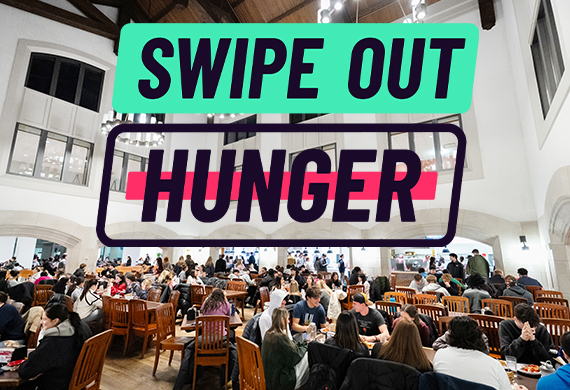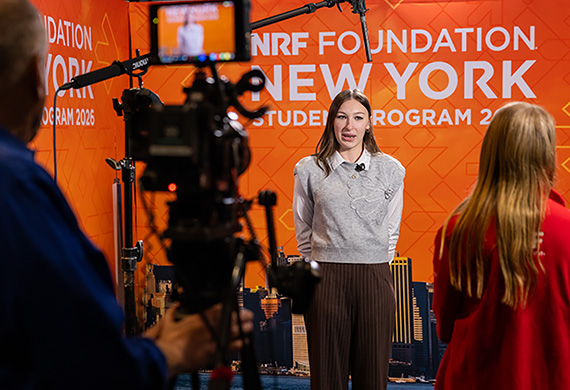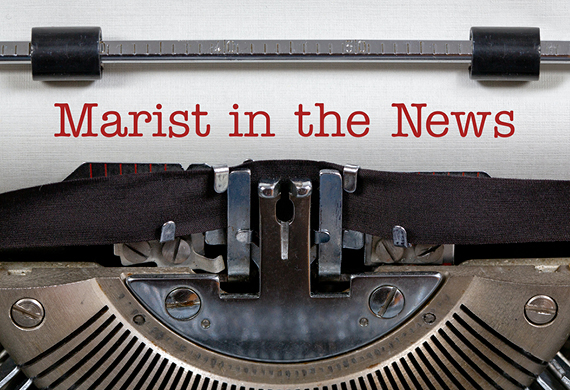Bestselling Authors Headline Explorations in Social Justice Conference
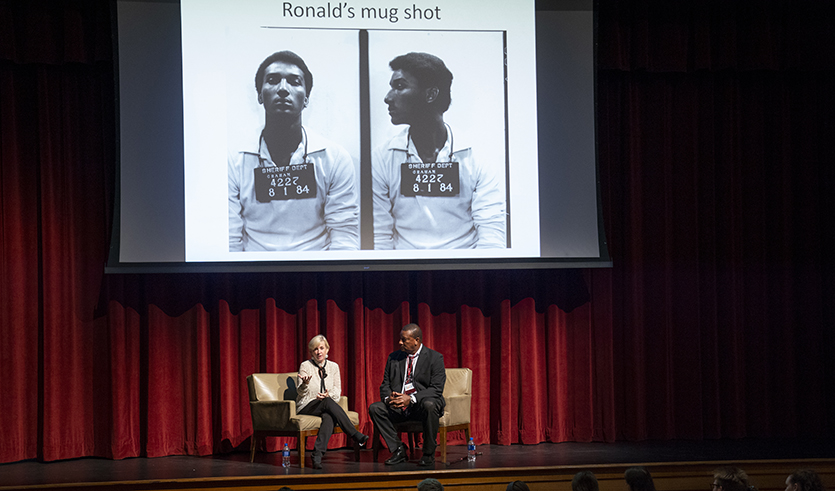
Ronald Cotton and Jennifer Thompson shared their powerful story in order to highlight flaws in the criminal justice system. It was part of a daylong examination of social justice-related topics.
October 7, 2019—For Director for Academic Diversity and Inclusion Addrain Conyers, the idea of organizing a social justice conference at Marist made sense. He noted, “Marist has always promoted social justice initiatives; it’s embedded in the campus culture.” So Conyers felt on solid ground working with Kristin Bayer, Director of Women’s, Gender, and Sexuality Studies, and Carol Rinke, Coordinator of Marist’s Center for Social Justice Research, to create a space for meaningful conversations about promoting social justice and building more inclusive communities. The result of this vision, Explorations in Social Justice, took place at the College on September 13, and it attracted attendees from both the College and the Hudson River Valley community. In his welcome, Vice President for Academic Affairs Thomas Wermuth noted that the aim of Explorations in Social Justice reflects both Marist’s mission and strategic plan: “We want to promote frank, challenging discussions, both inside and outside of the classroom.”
Explorations in Social Justice kicked off with a powerful keynote address by Ronald Cotton and Jennifer Thompson, authors of the New York Times bestseller Picking Cotton: Our Memoir of Injustice and Redemption. According to Conyers, “we wanted a keynote that would motivate people to pursue transformative social change.” Cotton and Thompson delivered, relating their compelling and tragic story to attendees in the packed Nelly Goletti Theatre. After suffering a brutal rape, Thompson provided eyewitness testimony that sent Cotton to prison for life. Eleven years later, DNA testing exonerated him and identified the true perpetrator. Upon his release from prison, Thompson and Cotton met (a reunion documented by PBS’ Frontline), formed an unlikely bond founded on forgiveness, and co-authored their bestselling memoir.
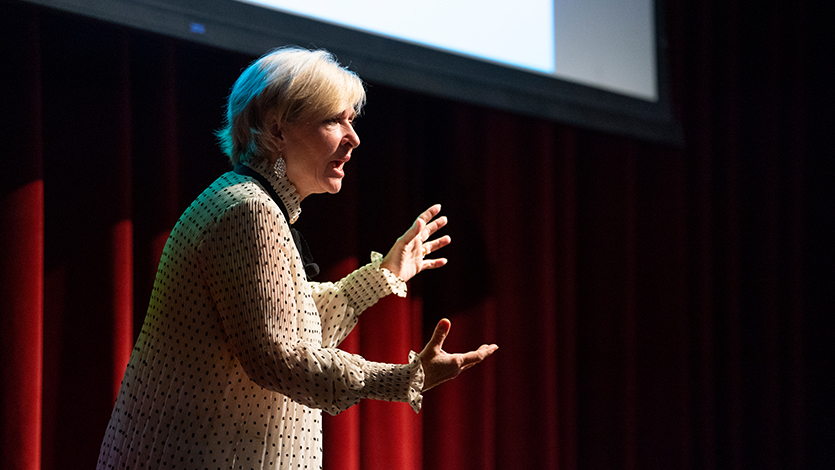
Keynote address speaker Jennifer Thompson
In her remarks, Thompson shared that during her privileged upbringing in North Carolina, justice seemed to be a clear-cut matter. “I understood that if you were in handcuffs, you were guilty and deserved your punishment. I didn’t question it.” The night of the attack, Thompson did her best to remember details of the rapist and identified Cotton in court. It was only later that she learned how trauma can affect memory and how the brain doesn’t record events like a video camera. Thompson noted that – in addition to jailing an innocent person – every wrongful conviction allows a criminal to remain on the streets. In this case, Cotton ended up serving time for the crime of Bobby Poole, who went on to victimize additional women. Thompson called it “concentric circles of harm.”
In his part of the presentation, Cotton related the surreal and terrifying experience of being arrested, convicted of rape, sentenced to 54 years in prison, and meeting the actual perpetrator while behind bars. Initially consumed by rage, he wanted to kill the man whose crime he was being punished for. Instead, Cotton summoned the inner strength to forgive Thompson for misidentifying him and focused his energies on having his criminal case re-examined. He took a photo of him and Poole together (to show the resemblance) and shared it with his lawyer. He also spent time researching the emerging field of DNA and succeeded in convincing the court to grant him a DNA test, which pointed to Poole as Thompson’s rapist. Cotton was released from prison the next day, 11 years after he arrived, and managed to rebuild his life, though he never received any significant compensation from the state of North Carolina. And his meeting with Thompson? She apologized, they embraced, and the two formed an unlikely friendship. For years, they have spoken about their case at venues all around the country, and in no small part, the movement to reform how eyewitness testimony is collected can be attributed to Cotton and Thompson’s bravery as advocates for justice.
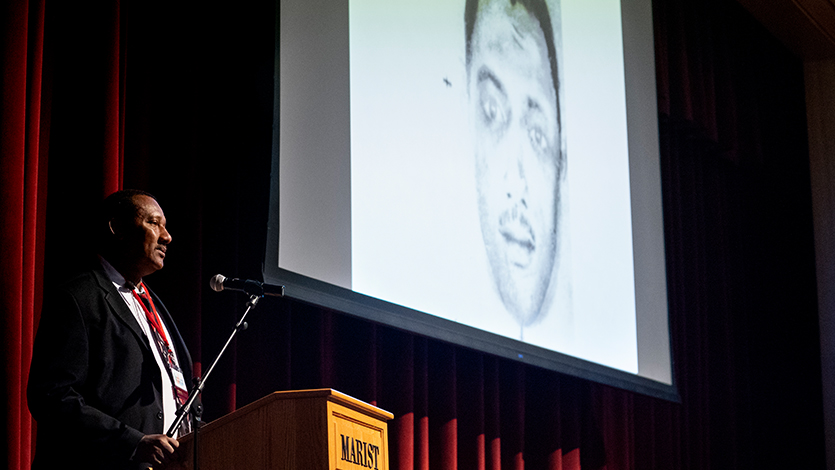
Keynote address speaker Ronald Cotton
The rest of the conference featured discussion panels covering a broad range of topics, student research posters, and facilitated affinity groups. Sessions included Criminal Injustices, Title IX/Sexual Assault, Suicide Prevention, Transgender Rights, Social Justice Advocacy, Environmental Justice, Immigration and Borders, and Tools for Promoting Social Justice. In addition, Assistant Director of Counseling Services Marisa Moore received the inaugural Marist College Social Justice Award, which recognizes members of the Marist community who have fostered substantive change on campus through intentional practices that welcome all individuals. During her tenure at Marist, Moore has made Counseling Services more accessible to students from marginalized backgrounds by actively engaging with student groups to discuss barriers to mental health. She has also led efforts by the LGBTQ+ Subcommittee to the Diversity Council to improve and facilitate ally training on campus. The conference ended with a closing talk by Charlotte Burrows, Commissioner of the US Equal Employment Opportunity Commission (EEOC). During her career at EEOC, Burrows has been an advocate for strong federal enforcement of employment laws – focusing in particular on pay equity – as well as initiatives to combat harassment and retaliation and to promote diversity in employment.
Conyers considers the inaugural Explorations in Social Justice conference a resounding success. “We think the conference illustrated that there is a desire for individuals to be educated and enlightened as citizens in an increasingly diverse global community. That Marist is the venue for these conversations of national import can only serve to benefit our students.”
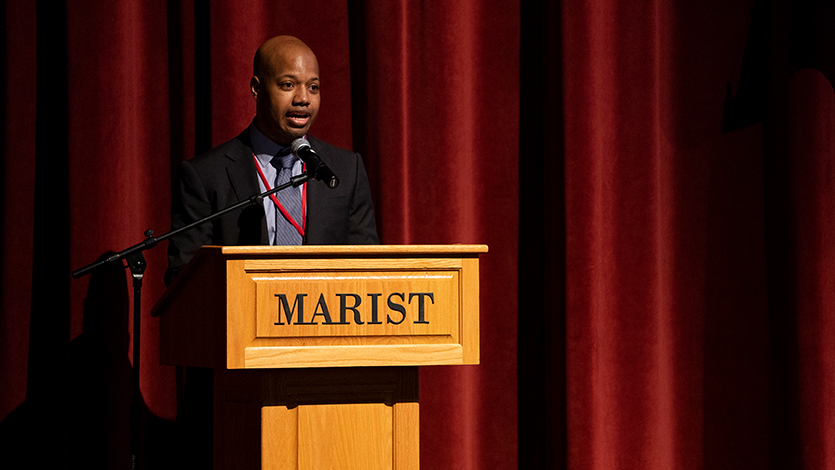
Director for Academic Diversity and Inclusion Addrain Conyers

